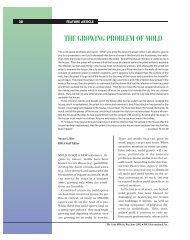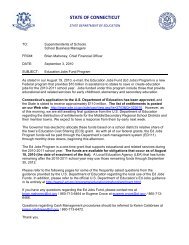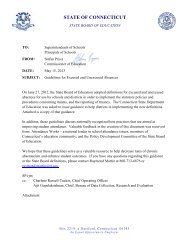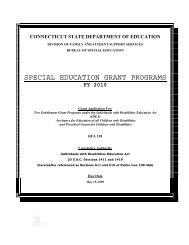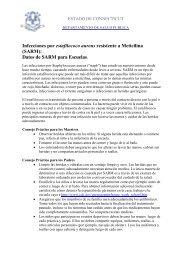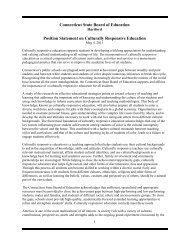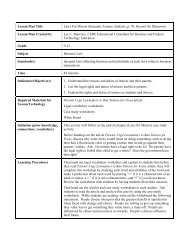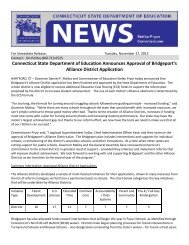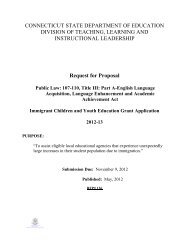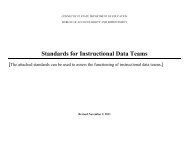Early Childhood - Connecticut State Department of Education
Early Childhood - Connecticut State Department of Education
Early Childhood - Connecticut State Department of Education
Create successful ePaper yourself
Turn your PDF publications into a flip-book with our unique Google optimized e-Paper software.
Social-Emotional Competence and Family Relations Chapter 10<br />
BEST PRACTICES<br />
<strong>Early</strong> childhood educators are encouraged to consider<br />
the following best practices in fostering social-emotional<br />
development.<br />
• Use positive words <strong>of</strong> encouragement such<br />
as, “You are doing a good job picking up<br />
your socks.”<br />
• Spend time developing relationships with<br />
each child.<br />
• Provide language models for children as they<br />
try to express concerns and solve problems.<br />
• Provide opportunities to discuss feelings, using<br />
literature and puppets as springboards.<br />
• Pair a child who is behaviorally challenged<br />
with a strong peer model.<br />
• Use praise quietly and individually. Avoid<br />
manipulating children’s behaviors by <strong>of</strong>fering<br />
rewards or compliments in front <strong>of</strong> a<br />
group.<br />
• Respect a child’s wish not to participate in an<br />
activity. Provide alternatives that may be acceptable<br />
within the learning environment.<br />
• Provide lots <strong>of</strong> opportunities for children to<br />
play and participate in groups with other<br />
children.<br />
SOCIAL-EMOTIONAL DEVELOPMENT<br />
IN A GROUP SETTING<br />
Many children spend much <strong>of</strong> their waking hours<br />
in group situations, most <strong>of</strong>ten in early childhood<br />
classrooms. These groups are miniature communities<br />
that require social skills. Children do not automatically<br />
develop social skills. They need direction, support and<br />
experiences led by teachers who can take advantage<br />
<strong>of</strong> teachable moments and planned activities. Social<br />
competence, the ability to initiate and maintain satisfying<br />
reciprocal relationships with peers, is a critical part <strong>of</strong><br />
early childhood development. The teacher’s role is<br />
both guide and leader. Teachers model compassion,<br />
responsibility, trust and concern for others with the<br />
language used in the classroom and the climate they<br />
create and carefully maintain. “The teacher purposefully<br />
leads children from the world <strong>of</strong> me to the world <strong>of</strong> us” (Stone,<br />
1999).<br />
Knowledge <strong>of</strong> child development provides<br />
a framework for use by teachers in making decisions<br />
regarding behavior, routines and activities in the<br />
classroom setting. Teachers must be patient. Young<br />
children, by nature, regress, make mistakes, and need<br />
time to rehearse and practice emerging skills and abilities,<br />
especially in the emotional and social domains.<br />
Group and peer behaviors to be encouraged in<br />
an early childhood classroom include the following:<br />
136<br />
• sharing;<br />
• taking turns;<br />
• being patient;<br />
• being respectful;<br />
• negotiating;<br />
• cooperating;<br />
• articulating preferences;<br />
• explaining actions;<br />
• accepting compromises;<br />
• empathizing with others;<br />
• handling impulses; and<br />
• being responsible for actions.<br />
The child’s developmental stage and ability,<br />
temperament, cultural values, particular situations,<br />
peers, the environment and classroom expectations,<br />
influence these behaviors.<br />
BEST PRACTICES<br />
The following best practices are recommended for<br />
implementation by early childhood educators in group<br />
settings.<br />
• Ensure consistency and predictability in your<br />
expectations and classroom guidelines.<br />
• Engage children in building classroom<br />
climate. Promote discussions <strong>of</strong> class rules<br />
and expectations.<br />
• Model support and understanding <strong>of</strong> feelings.<br />
Encourage children to support each other.<br />
• Encourage children to use verbal skills when<br />
communicating with peers.<br />
• Offer guidance on negotiating as children try<br />
to compromise and collaborate.<br />
• Provide opportunities for children to be<br />
responsible, make choices, cooperate and<br />
share.<br />
• Use techniques to encourage turn-taking.<br />
• Evaluate the daily schedule to determine how<br />
<strong>of</strong>ten and for how long children are in largegroup<br />
situations. Minimize this practice in<br />
favor <strong>of</strong> opportunities for children to meet in<br />
small groups or pairs. Children, ages 3 and<br />
4, do not pr<strong>of</strong>it from group times <strong>of</strong> over 15<br />
to 20 minutes.<br />
• Provide children with a consistent daily<br />
schedule and alert them when changes are<br />
made in the routine. Children benefit from<br />
the security <strong>of</strong> knowing what is expected and<br />
what is next.<br />
• Plan a daily routine that provides for varied<br />
groupings, noisy and quiet times, active and<br />
slower-paced experiences.




